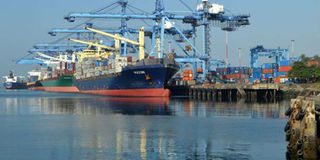Insurance order good for maritime industry

Cargo vessels berth at the Port of Mombasa on February 5, 2016. There is growing demand for a maritime workforce and Kenya needs to enhance training or face a serious shortage of personnel. PHOTO | KEVON ODIT | NATION MEDIA GROUP
What you need to know:
- The need to retain revenue in Kenya in the form of premiums and the creation of more insurance business for domestic players was realised in 1999.
- The inclusive multi-agency approach that the parties have adopted to draw the directive’s implementation roadmap is creative.
The Treasury’s directive that came into force on January 1 requiring all importers to procure marine insurance cover from Kenyan firms should be an entry point for the country to tap the largely unexploited maritime industry, also known as the “blue economy”.
For many years, the industry has not received policy attention commensurate with its value.
The need to retain revenue in Kenya in the form of premiums and the creation of more insurance business for domestic players was realised in 1999.
The Insurance Act was amended to provide for compulsory insurance of Kenyan imports through locally registered companies.
However, lack of proper coordination between the various agencies involved in clearing cargo and lack of a clear implementation strategy has seen the intended benefits of the amendment elude the country for over a decade and a half, forcing it to cede premiums estimated to be more than Sh20 billion a year to foreign insurance firms.
The inclusive multi-agency approach that the parties have adopted to draw the directive’s implementation roadmap is creative.
It should now form the basis on which many other unexploited areas of the maritime industry should be tackled.
To do this, the country needs to enact a comprehensive integrated national maritime policy.
With Kenya’s territorial waters covering 230,000 square kilometres and a distance of 200 nautical miles offshore, the maritime sector has huge potential that can form Kenya’s next economic growth frontier.
The government has recognised the need to focus on the maritime industry and set up the Shipping and Maritime Affairs Department in the Ministry of Transport to steer the process.
To tackle the task, however, the department needs more resources than it has been allocated.
And there are quick wins.
For instance, Kenya does not own commercial ships.
The debate has raged for many years on whether the country should open up the local register to allow ships to fly our national flag.
NEW FRONTIER
With the huge infrastructural projects the government is undertaking, this would be a gold mine for Kenya.
Landlocked Ethiopia has purchased eight ships, which earn it $40 million annually.
It has been decreed that all government-procured cargo be shipped in these vessels.
Other African countries, such as Liberia, are an example of success that Kenya can emulate.
The cruise ship business, which suffered between 2010 and 2012 due to pirate attacks off the East African coast, is showing signs of recovery and holds much potential.
The planned construction of a new berth to cater for cruise business at the Port of Mombasa is a positive sign.
Similar initiatives should be extended to Lamu and Shimoni ports and bring in more players, especially those in the tourism industry.
Kenya has huge potential for cruise tourism and, in 2004, at least 42 vessels arrived in Mombasa with 15,166 passengers taking safaris to national parks.
The country also needs an attractive and effective fiscal and regulatory environment to encourage investment in local ship-building, repair and maintenance and discourage the export of maritime services such as container cleaning.
To optimise gains, there is a need to invest in human resource by rolling out training programmes in institutions of higher learning and tertiary colleges.
Only three colleges and four universities in Kenya offer maritime courses.
There is growing demand for a maritime workforce and Kenya needs to enhance training or face a serious shortage of personnel.
The writer is a consulting editor of a freight magazine. [email protected]





